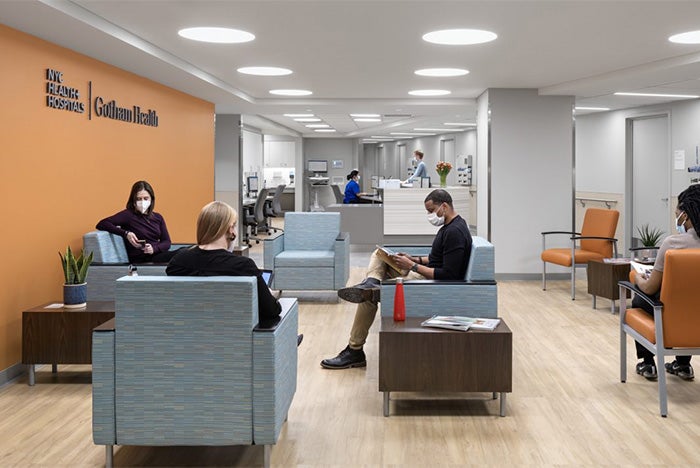Planning for post-COVID-19 care in the physical environment

Since 2020, NYC Health + Hospitals has opened three outpatient clinics dedicated to post-COVID-19 recovery care.
Image by Andrew Rugge-Perkins Eastman.
With the help of public health policies, vaccines and new medical treatments, the COVID-19 infection rate in the U.S. has decreased significantly from its peak. However, even though daily rates are below previous highs, a trail of lingering post-infection symptoms have followed.
Post-acute sequelae SARS CoV-2 infection (PASC), known informally as “long COVID-19” or “post-COVID-19,” is marked by a multitude of symptoms that can affect respiratory, heart, neurological and digestive systems, as well as lead to other general issues such as fatigue, prolonged fever, and joint or muscle pain. Symptoms can occur for weeks, months and even years after a patient’s acute infection has cleared.
Patients battling PASC have spurred dozens of hospitals to create post-COVID-19 clinics. As of press time, Becker’s Hospital Review has a list tracking 66 in the U.S. alone. Because treatment requires a multidisciplinary approach, many hospitals are tasked with finding, modifying or creating a physical space suitable for post-COVID-19 care.
UCHealth based in the Denver metropolitan area was one of the first in its region to launch a post-COVID-19 clinic in 2021. William Niehaus, M.D., the outpatient medical director for physical medicine and rehabilitation at UCHealth’s University of Colorado Hospital, says the clinic was started through a grant for post-intensive care unit survivors, and brought together a number of specialists from pulmonary, cardiology, therapy and others to form the clinic.
“It probably took six to eight months to formalize and adopt the clinic and, after that, we had to work on the logistics of where the physical space was going to exist,” Niehaus explains. “Ultimately, it was decided to house it in one of our existing outpatient clinics that already had a lot of the infrastructure we would need.”
The clinic houses equipment necessary for pulmonary diagnostics and care, as well as a 6-minute walking path outlined in a hallway to help patients recover strength and functions ravaged by the infection.
Niehaus says the clinic began seeing patients in May 2021, treating about 30 patients in the first few months. By September 2021, the patient number had doubled to 60. By March of this year, the number increased to 80 patients per month dealing with PASC.
“We do know that there are truly long-term post-acute qualities of COVID-19 that exist, and it’s likely three, five or seven things all mashed together.” Niehaus says. “COVID-19 seems to be affecting multiple organ systems, so having a multidisciplinary approach has been helpful.”
NYC Health + Hospitals was another early adopter of PASC care. Prior to March 2020, the public health system was planning to build three outpatient clinics in health care deserts around the city, one each in Queens, the Bronx and Brooklyn. With the onset of the pandemic, the projects were fast-tracked and pivoted to serve as clinics that could offer post-COVID-19 recovery care. The three COVID-19 Centers of Excellence opened in November 2020 in the Bronx, January 2021 in Queens and March 2021 in Brooklyn.
“We were still in the first surge when we started thinking about how to care for our patients that were recovering from COVID-19,” says Christine Flaherty, senior vice president of facilities development. “As schematic designs were wrapping up, we added a number of clinical features to the spaces based upon our lessons learned from that first wave.”
As care providers gathered new information about PASC, treatment spaces were added or began taking a bigger role in the centers, such as lung care and supplemental oxygen, heart care, diagnostic radiology services and mental health services for those dealing with anxiety, depression, post-traumatic stress disorders and other psychological distress. Even exam room sizes were adjusted when the care providers learned that patients of size are often hit harder by COVID-19 infections.
Rachel Birnboim, AIA, LEED AP BD+C, co-managing principal of the New York Studio of Perkins Eastman, served as project manager for all three centers, and says that it was critical to work closely with the client as the project was being built.
“The intention was to create each of these as a one-stop-shop,” she says. “It was really important to not have to cart patients from one facility to another when seeking their day-to-day care.”
Jeff Brand, AIA, EDAC, principal, executive director and leader of the health care practice at Perkins Eastman, says that more of the firm’s health care clients are beginning to think about the future of post-COVID-19 care.
“We have learned a great deal about how the health care built environment needs to be designed to safeguard against infectious disease and what has worked to create effective space for patients and the medical staff,” Brand says.
“The COVID-19 Centers of Excellence are a bridge for these communities to provide health care and keep people safe and healthy,” Brand continues. “The untold story on some level is that long COVID-19 is going to affect even more people for prolonged periods of time. Our overall health care system at all levels of care needs to be able to withstand and support surges of people with infections and needs to be updated with spaces and programs that are focused on the emotional, diagnostic and treatment needs of long COVID.”
In addition to serving PASC patients, the centers also are hubs of generalized services, offering cancer screenings, dental and vision, women’s health, diabetes management and more.




